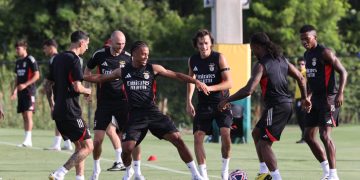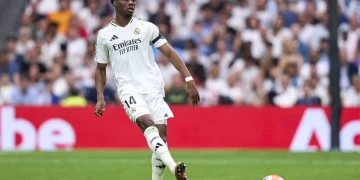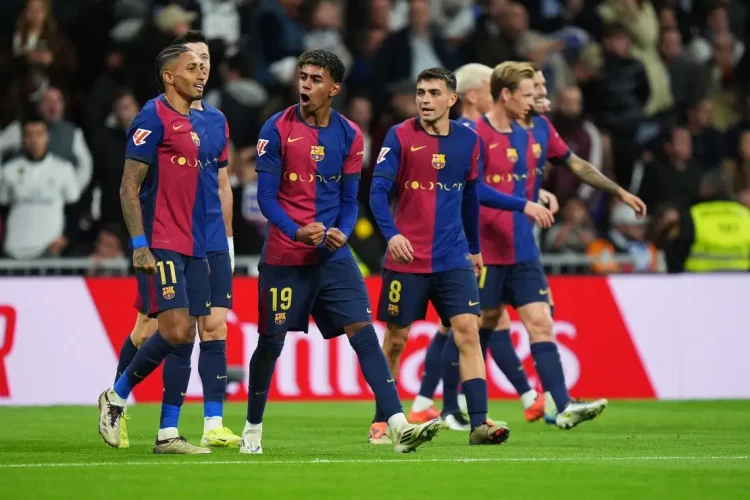Introduction
In the world of football, few clubs have a legacy as storied as FC Barcelona. With its proud tradition of attacking football, La Masia academy, and historic success both domestically and in Europe, Barcelona has long been regarded as one of the most iconic and successful clubs in the world. However, in recent years, the club has faced financial turmoil, internal strife, and a decline in performance that has seen them fall from European prominence.
The fall from grace culminated in their humiliating 8-2 loss to Bayern Munich in the 2020 UEFA Champions League quarterfinals, marking the end of an era. But Barcelona has since embarked on a rebuilding process, both on and off the pitch, with the hopes of returning to the pinnacle of European football. Under the guidance of coach Xavi Hernandez, who himself is a product of the legendary Barcelona youth system, the club has been slowly but surely working its way back to relevance.
This article will examine whether Barcelona can truly return to their former heights. Can they regain their competitive edge in Europe and challenge the likes of Bayern Munich, Manchester City, and Paris Saint-Germain for the UEFA Champions League? And what does the future hold for a club in transition, having weathered financial crises, managerial changes, and a squad overhaul?
Section 1: Barcelona’s Recent Struggles – A Fall from Grace
1.1 Financial Crisis and the Departure of Messi
Barcelona’s recent troubles stemmed largely from a financial crisis that began to take shape during the 2010s. Excessive spending on transfers, inflated wages, and the financial fallout from the COVID-19 pandemic left the club in a precarious position. By 2021, Barcelona was facing massive debt, reported to be over €1.5 billion, and unable to register Lionel Messi’s contract under the Spanish La Liga’s financial fair play rules. The departure of Messi, the club’s greatest ever player, was both symbolic and devastating for the club’s identity. Messi’s departure to Paris Saint-Germain marked the end of an era and left a massive void in both the squad and the club’s global image.
1.2 Decline in Sporting Performance
On the pitch, Barcelona’s struggles continued after Messi’s departure. The club entered a period of instability under managers such as Ronald Koeman and Quique Setién, failing to find the same rhythm that made them European and domestic giants under Pep Guardiola and Luis Enrique. In addition to poor results in the Champions League and La Liga, Barcelona found themselves falling behind their traditional rivals, especially Real Madrid and Atletico Madrid in Spain. The team also saw the decline of key players like Gerard Piqué and Sergio Busquets, both of whom had been pivotal in the club’s success for over a decade.
- The Messi Void: No player can ever replace Messi, and his absence has undoubtedly had a profound impact on Barcelona. The team’s attacking play, once built around Messi’s magic, has struggled to find its identity in recent years. While players like Ansu Fati, Memphis Depay, and Martin Braithwaite have attempted to fill the gap, none have been able to offer the same level of creativity, vision, and consistent brilliance that Messi provided.
- Poor Champions League Runs: Barcelona’s form in the Champions League has been disappointing in recent years. They failed to make it past the quarterfinals in several seasons and suffered embarrassing exits, including their infamous 4-0 defeat to Liverpool in 2019, which followed the 3-0 first-leg lead in the semifinals.
1.3 Xavi Hernandez’s Appointment – A New Beginning?
In November 2021, Barcelona turned to one of their own: Xavi Hernandez, a club legend and former captain, was appointed as head coach. Xavi, who had enjoyed great success as a player at Barcelona, was tasked with returning the club to glory. Having previously managed Al-Sadd in Qatar, Xavi was known for his commitment to possession-based football, which mirrored the style of play that had made Barcelona successful under Guardiola. However, inheriting a squad full of challenges, Xavi’s task was monumental. Could he instill discipline, restore Barcelona’s identity, and make the club competitive again, especially in Europe?
Section 2: The Rebuilding Process – Barcelona’s Path to Redemption
2.1 Tactical Revival Under Xavi
Since Xavi’s arrival, Barcelona has shown signs of recovery, both in terms of results and style of play. One of Xavi’s first tasks was to instill a solid defensive structure and a clear tactical philosophy, which had been missing during the chaotic years under previous managers.
- Possession-Based Football: Xavi has tried to bring back the tiki-taka style, the short-passing game that Barcelona became famous for under Guardiola. The key principles of high pressing, possession retention, and creating overloads in attacking areas have been reintroduced. Xavi’s possession-based approach has already led to significant improvement in how Barcelona controls games, particularly in La Liga.
- Balanced Attacking Play: While Xavi has revived the possession game, he has also injected more verticality into the attack. The presence of Robert Lewandowski, Barcelona’s marquee signing in 2022, has brought an added goal-scoring threat, something Barcelona lacked in the post-Messi era. Xavi has made the most of Lewandowski’s movement, combining it with young talents like Pedri, Gavi, and Ansu Fati to create a potent offensive threat.
2.2 Key Signings and Squad Overhaul
The key to Barcelona’s rebuild has been their smart recruitment. Despite the financial limitations placed upon them by La Liga’s salary cap regulations, Barcelona has made a number of shrewd signings to bolster their squad.
- Robert Lewandowski (2022) was the standout addition, offering Barcelona a proven goal-scorer who could shoulder the offensive burden. Lewandowski’s experience and clinical finishing provide the club with a focal point in attack that they have sorely missed in recent seasons.
- Jules Koundé (2022), Andreas Christensen (2022), and Franck Kessié (2022) have been brought in to strengthen the defense and midfield, giving Barcelona more depth and versatility. The return of Sergio Agüero from injury also added another dimension to their attacking options before his unfortunate retirement in 2021.
- Youth Development: Xavi has also reinvigorated the youth system, giving prominent roles to players like Pedri, Gavi, and Ansu Fati, who are expected to be the future of the club. These young players bring dynamism, creativity, and energy to the team and are poised to lead Barcelona into the next era.
2.3 Financial Restructuring – La Liga’s Salary Cap and Barcelona’s Financial Health
Barcelona’s financial situation remains delicate, and the club’s ability to navigate the financial fair play rules and La Liga’s salary cap will be crucial. However, the appointment of Joan Laporta as president and the strategic financial decisions taken by the club’s management have put Barcelona back on track.
- Player Sales and Wage Cuts: In order to meet financial requirements, Barcelona has had to make tough decisions, including player sales and wage cuts. The club sold a portion of their broadcasting rights and future revenue streams to raise immediate funds, while also offloading players like Antoine Griezmann and Frenkie de Jong to balance the books.
- Leveraging Assets: The club’s management has also opted to sell certain assets (such as sponsorship deals and future broadcasting rights) to ensure the club remains financially viable while still being able to compete at a high level.

Section 3: Can Barcelona Compete in Europe Again?
3.1 The Quest for Champions League Glory
Barcelona’s primary aim, after the domestic successes, remains regaining their spot among Europe’s elite. For years, the Champions League has been the benchmark for measuring success at the highest level, and Barcelona’s inability to challenge for it has been one of the key indicators of their decline.
- Tactical Adaptation for Europe: Under Xavi, Barcelona has shown improvement in their European performances, and their more structured, disciplined approach could prove to be the key to getting back to the Champions League final. However, they will need to overcome formidable opponents like Bayern Munich, Manchester City, Paris Saint-Germain, and Real Madrid, who have been more consistent at the highest level in recent years.
- Lewandowski’s Role in Europe: Having a player of Lewandowski’s caliber could make all the difference in knockout-stage games, where the margin for error is thin. His goal-scoring instincts and experience in the Champions League could be invaluable for Barcelona in their pursuit of the trophy.
- Youth and Experience: Balancing youth with experience will be crucial for Barcelona’s European aspirations. Players like Pedri, Gavi, and Ansu Fati bring much-needed energy and creativity, while veterans like Gerard Piqué (though he has retired) and Sergio Busquets offer leadership in crucial moments.
3.2 Realistic Expectations for Barcelona’s Return
Barcelona’s return to the summit of Europe will take time, and they must be patient with their rebuild. The team is still in transition, with plenty of room for improvement, especially in terms of their consistency at the highest level. Their ability to balance their domestic ambitions with European competition will be key. With Xavi at the helm and a reinvigorated squad, Barcelona’s dream of returning to the top of European football is very much alive.
Conclusion: A New Dawn for Barcelona?
The road to recovery for Barcelona has been a long and difficult one, but the club has shown resilience, determination, and ambition to bounce back. With Xavi Hernandez’s tactical vision, a rejuvenated squad, and a more stable financial outlook, the future looks promising for the Catalan giants.
While their return to European glory will be challenging, Barcelona has the necessary talent, experience, and mentality to fight for titles once again. The new Barcelona may not yet be at the same level as the club that conquered Europe during its peak, but it is clear that the rebuild is heading in the right direction.
Can Barcelona return to the summit of European football? Only time will tell, but the foundations for a successful future are being laid. With Xavi Hernandez leading the charge, the next chapter of Barcelona’s rich footballing history could soon be written.






























Discussion about this post